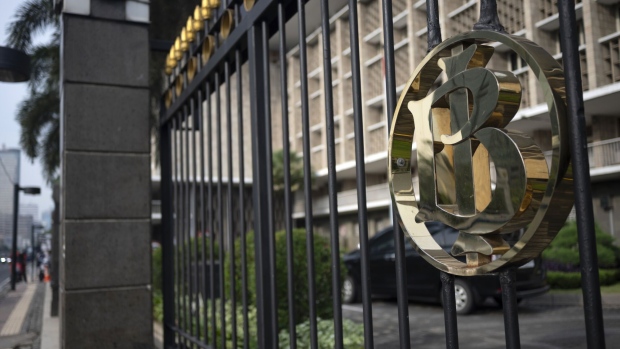Apr 24, 2024
Prabowo’s Aide Says Indonesia Doesn’t Need Another Rate Hike
, Bloomberg News

(Bloomberg) -- Bank Indonesia doesn’t need to further increase interest rates to shield the rupiah, according to an economic advisor of President-elect Prabowo Subianto who sought a monetary policy that’s supportive of growth.
“We set a fairly high growth target, there needs to be support from monetary policy. There needs to be stimulus,” Prabowo’s aide Dradjad Wibowo said in an interview on Wednesday, hours before BI’s briefing to announce its rate decision.
“We hope that fiscal and monetary policies will be maintained,” Wibowo said, expressing the desire of Prabowo’s team to keep economic policies steady ahead of the president-elect taking office in October. The incoming government is targeting to hit growth of as much as 8% during its five—year term.
The statement from a key member of Prabowo’s team highlights risks to the independence of monetary policymakers when governments weigh in, or in the case of Thailand, apply pressure on the central bank to lower borrowing costs to support growth. Despite his remarks, Wibowo reassured that the incoming leader will uphold BI’s independence.
A fourth of analysts surveyed including the one from Bloomberg Economics expect BI to hike by a quarter-point on Wednesday to shore up the rupiah. Many who anticipate a hawkish hold believe that policy easing will be delayed to as far back as 2025.
The local currency’s weakness, Wibowo said, wasn’t due to economic fundamentals so a rate hike isn’t needed at the moment. Even after BI’s surprise rate increase in Oct. 19, the local currency sustained its slump in the two weeks that followed.
On Wednesday, the rupiah gained for a third day against the dollar as pressure on emerging currencies eased. It traded at the highest level in a week, after crossing the psychological level of 16,000 in mid-April that prompted central bank intervention.
Prabowo’s planned spending on programs including free school lunches and milk sparked renewed concerns that it will weigh on the rupiah. The spending spree could reach 460 trillion rupiah ($28.5 billion) annually toward the latter part of Prabowo’s five-year term. That amount exceeds the 2023 budget deficit.
“Many say Prabowo’s policies will break the budget. It does require large funds, but it will still be done within the corridor or fiscal discipline,” Wibowo said. “There will be no fiscal irresponsibility,” the advisor said.
Prabowo, who will be sworn in as president on Oct. 20, is committed to ensuring the independence of BI under his leadership while encouraging coordination so that monetary policy mix would align with economic expansion, his aide said.
In the longer term, he would seek to reduce food imports to improve the balance of payments, Wibowo said.
--With assistance from Grace Sihombing.
©2024 Bloomberg L.P.






